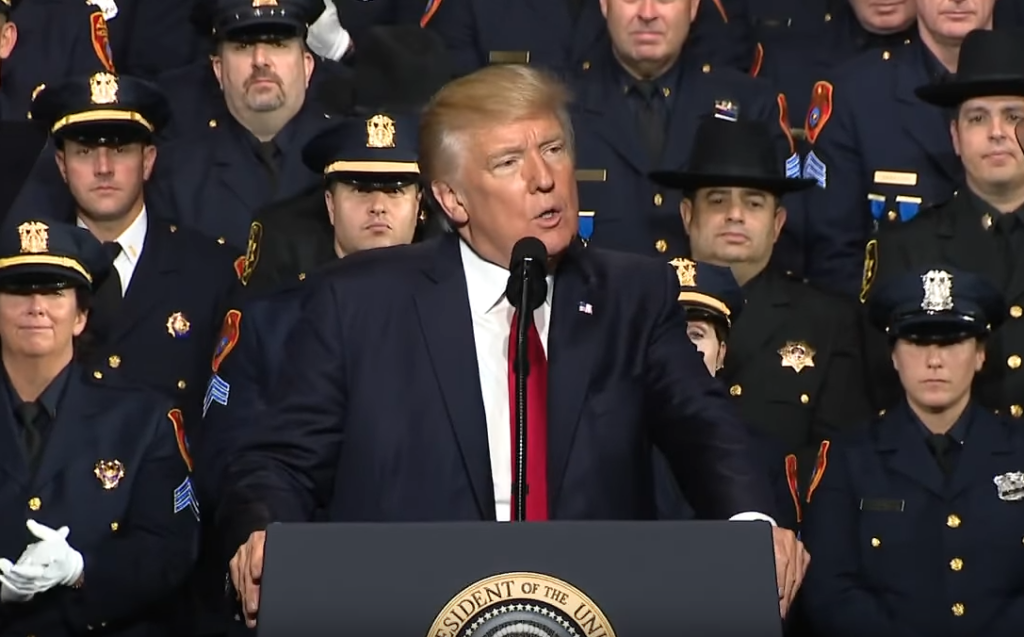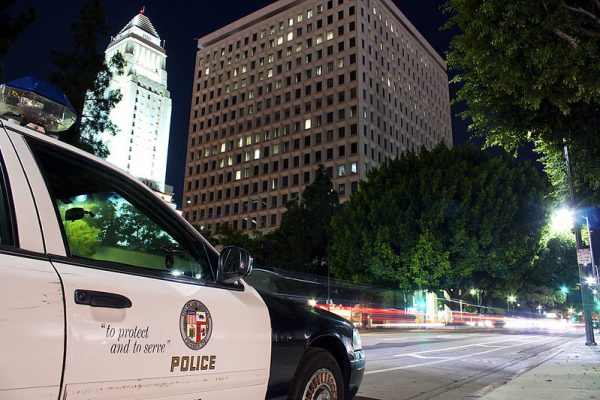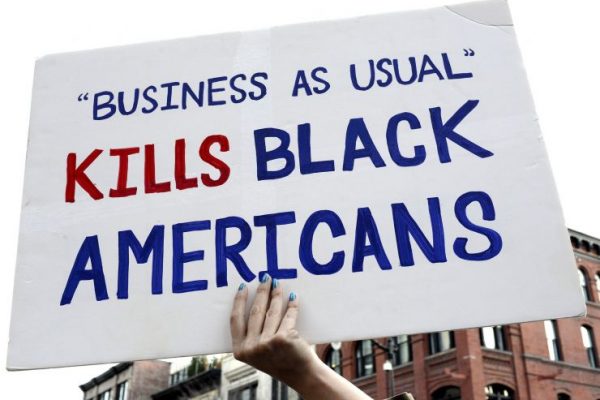On May 25 in Minneapolis, Minnesota, George Floyd lay handcuffed and face down for almost nine minutes while police officer Derek Chauvin kneeled on the back of his neck and head. Floyd repeatedly said that he could not breathe. But Chauvin did not relent, and Floyd died of asphyxiation.
Floyd’s murder, captured clearly on video, has led to weeks of protest both at home and abroad. The size and intensity of these protests reflect the pervasiveness of injustice for people of color in the United States. Now more than ever, the role of policing in perpetuating this injustice is being acknowledged and subjected to public scrutiny. There have increasingly been calls to abolish or defund the police.
Such radical rhetoric has made America’s moderate liberals uneasy. They would prefer instead a healthy dose of reform. Alex Vitale, a sociologist at Brooklyn College, is one of the foremost critics of this reformist approach. In his book The End of Policing (2017), he comprehensively details the failure of liberal reform efforts to rein in policing—reforms invariably aimed at producing “better” policing. What this program ignores, Vitale contends, is that the very institution of policing is only a symptom of a larger problem. We must stop funding violent and ineffective policing, Vitale argues, and instead direct that money toward providing social services that under-resourced communities need.
In this interview we discuss how we got here, exactly what the problem is, and what can be done about it.
—Scott Casleton
Scott Casleton: I want to start with two central themes in your book: the expansion of policing in terms of increased responsibilities and funding, and the origin and function of policing. Let’s start with the first. What has driven this expansion?
“We just cannot fix policing with a set of superficial, technocratic reforms.”
Alex Vitale: Well, to understand police funding you have to look at the larger structure of economic life in America. Over the last forty to fifty years we’ve seen a political transformation in the United States. Both political parties have embraced a kind of neoliberal austerity. Under the pressures of global competition, politicians at all levels have decided that the only thing they can do is is to subsidize the already most successful parts of the economy in hopes that this will produce a kind of trickle-down effect—a kind of voodoo economics that will create some benefits for people. And it’s driven in part by the fear that no one wants to be Detroit, that cities are under pressure and that there is a need to find some kind of path forward. And the path they’ve chosen is to embrace high finance, downtown real estate deals, particular corporate headquarters, subsidize corporate headquarters, and so on.
All this has left these local places broke. It has created tremendous wealth for the people who were parties to those deals, and then maybe somebody who runs a coffee shop or a food cart gets a little bit out of that, but it has not trickled back down into the neighborhoods. This is true all across the country. The result has given rise to mass homelessness, mass untreated mental illness, massive involvement in informal and black markets around drugs and sex work, and stolen goods as survival strategies for this growing number of people who are essentially completely disconnected from meaningful participation in the global economy.
As those people who are left out turn to these other activities, mayors have used the police to criminalize them—to define their behavior as criminal, as an example of individual or group moral failure—and have said that the only way we can manage this is to use people with guns, and to put people in cages. And this is not just a political failure: it’s an ethical failure of the highest order, and it has led to the expansion of policing into schools, into the management of homeless people, into the handling of mental health calls, into the demonization of our young people.
SC: You’ve noted that this trend applies just as well to mayors of ostensibly progressive cities. Do they really think policing is going to help fix the underlying problems of crime and poverty, or do they feel powerless to solve the underlying economic problems, so the best they can do is limit the crime it produces?
AV: I think that the key to understanding this distinction you raise is to acknowledge that we have a deeply flawed political system that has been captured by big money. It assumes that these Democratic mayors are operating on entirely good faith with the interests of the overall citizenry that they represent. But in fact, the largest contributors to local political campaigns across the country are real estate interests, who do not have the interests of the general public in mind, who want to make their downtown real estate deals, and they use all the leverage they can to manipulate this political process, to capture as much of that local, state, and federal money as they can, and to punish politicians who stand in the way of that.
That makes this story about a set of political choices in a very particular environment—not just of global economic competition, but of big-money politics. What’s needed is a radical rejection of that big-money politics and that neoliberal strategy, and it is possible. We cannot accept “there is no alternative.” This is a false analysis of the problem, and one of the hopeful things that we’re seeing right now is the rise of Democratic Socialists of America, and a whole generation of progressive urban politicians who are trying to push back against this idea. And I think that’s part of what’s happening in Minneapolis, where they’re demanding a total rethink on turning every problem under the sun over to the police to manage.
SC: So, to use the popular slogan, “defund the police” isn’t something we do in isolation—it’s part of a larger effort to address underlying political and economic problems. Is that right?
AV: Yeah, so a few things. One is that this #DefundThePolice movement understands very clearly what it’s about. It was a slogan that could be put on a cardboard sign in a crisis to signal that the solution to our problems is not body cameras and implicit bias training anymore—that we’re not going to accept these superficial procedural reforms, that we want to get to the heart of the matter, which is the radical expansion of police power.
“The decision to turn social problems over to the police is a political decision (as is the creation of the social problems in the first place).”
Given that, I often say that my book The End of Policing isn’t really a book about police accountability, it’s a book about political accountability. Because the decision to turn social problems over to the police is a political decision (as is the creation of the social problems in the first place). Responding to this deeply entrenched form of governance requires a new politics. We just cannot fix policing with a set of superficial, technocratic reforms, because they don’t address the way the most basic needs of people have themselves been defunded, creating the “crime” that must be policed in the first place. And that dynamic requires a profound political transformation that neither political party’s leadership is prepared to embrace right now.
In the short term there’s so much waste, there’s so much misspent money in policing that we can start there—defunding and shrinking police forces—and shift huge amounts of resources into communities. But to really fix the problems of mass homelessness, economic precarity, healthcare disparities, that’s going to require more resources—whether that comes from states, or the federal government, or a complete rethink about how taxes are structured in these big cities.
SC: That takes us to the second theme of your book: the origin and function of policing. You often describe policing as a method of “social control.” This makes it sound like there is someone behind the scenes pulling the strings.
AV: There is someone pulling the strings. It’s the politicians who create a war on drugs, who refuse to build housing, but create police homeless outreach units instead. The police are thus a tool of the state—they are violence workers acting on behalf of the state—but they’ve been wrapped up in this myth that they’re neutral, independent crime fighters, that they’re an extension of the law, and that their enforcement of that law is automatically beneficial to everyone. But this view radically misunderstands the actual nature of these legal systems. They do not inherently benefit everyone equally.
There’s a famous saying by Anatole France that “the law in its majesty forbids both the rich and the poor from sleeping under bridges, stealing bread, and begging in the streets.” But of course, the rich don’t need to do these things, and by the same token when we create an intentionally racialized war on drugs, we invariably reproduce racial inequality in the United States. And class inequality as well, because the problematic drug behavior of wealthy people, which is widespread, gets dealt with through clinics, rehab programs, and family dynamics. In poor and nonwhite communities these problems get dealt with instead by the criminal justice system, and that makes their lives worse, not better. These interventions are completely ineffective. So we don’t need narcotics units to get anti-bias training to fix the racial disparities in the drug war; we need to get rid of the entire legal framework of the drug war. It is inherently, substantively unjust, and no amount of procedural reforms to policing will do anything to overcome that injustice.
The point is that we cannot only look downstream at very particular policing practices. We also have to interrogate the legal frameworks that are being put in place that then police are being told to enforce. Those legal frameworks serve the interests of some people more than others. They are the glue that holds the whole system together, the root of the problem. This or that incremental police reform will do nothing to dismantle the fundamental logic of the system.
“The police are a tool of the state—they are violence workers acting on behalf of the state—but they’ve been wrapped up in this myth that they’re neutral, independent crime fighters.”
For another example, take police militarization—the focus of a lot of discussion of reform. Militarization is in fact just the most extreme tip of the largest pervasive problem, of turning social problems and political problems over to the police to manage. And as that process has become intensified and we’ve created more wars against the poor, then we give police more military technology and unleash them on the population. And this is not just about the technology, the equipment—it’s also about the culture and the framework, the ethos of policing that comes to see the public as an enemy to be suppressed. But even if we got rid of all of that, a totally lawful, procedurally proper, unbiased drug arrest is still going to ruin some young person’s life for no good reason. We can’t just get rid of the tanks. We have to get rid of our overreliance on police.
SC: Okay, so let’s say you get your way and we end the war on drugs and achieve other kinds of decriminalization, like for “quality of life” crimes and sex work. But not everything can be decriminalized. I take it there will be some remaining residue of criminal behavior—whose job is it to handle that?
AV: We don’t know what that residue is going to look like. We really have no idea, because we have concrete, evidence-based strategies to deal with youth violence, homicides, domestic violence, school shootings. This is not about just getting the police out of the homelessness and mental health business: this is about a radical rethink about how safety is produced. When you go into wealthy neighborhoods, safety is not produced by having a police officer on every street corner. Those communities are safe and secure because the people who live in them have safe and secure lives. They have stable employment, and stable housing, and good schools. Well, why can’t we have that for everyone?
Once we begin to think this way, all these taken-for-granted ideas about what crime is and how we control it begin to dissolve. And then we see what’s left. Yes, people will do bad things, but the idea that the only way to deal with that is people with guns and the use of cages is not necessarily true. Yes, we need systems of accountability and systems of social control, but armed police are not the only—much less the best—way to achieve that.
SC: This goes to a central idea that many people take for granted: police prevent crime. You say this is a myth. Why?
AV: There was a long literature in policing that looked at a whole raft of studies that attempted to perform experiments on this question—to change patrol strength, to shift people to foot patrols, to measure the different densities of the policing—and all that research showed no effect for decades. (As the police scholar David Bayley put it in his 1994 book Police for the Future, “The police do not prevent crime. This is one of the best kept secrets of modern life. Experts know it, the police know it, but the public does not know it.”) More recently, there were a few studies, just a few, that were able to show some statistically significant measurable effect for changes in policing. But those effects, while statistically significant, are actually quite small. And what these studies never do is measure the collateral consequences of using policing as opposed to other strategies. They never explore the opportunity cost of putting money into policing as opposed to community-based interventions; they never calculate the negative consequences of driving more people into the criminal justice system; they never calculate the financial cost of police, and prisons, and court systems. This work thus happens not just in a data vacuum, but also in an ethical vacuum: they never bother to consider the consequences, in people’s actual lives, of relying on strategies of criminalization.
“We cannot only look downstream at very particular policing practices. We also have to interrogate the legal frameworks that are being put in place that then police are being told to enforce.”
So even if we can find some small measurable, positive effect for flooding a community with police, that doesn’t make it just, that doesn’t make it the best solution, and that doesn’t mean that the answer is to put police on every corner. The idea that more police and fewer arrests will lead to crime reduction is a gross misunderstanding of how policing actually operates. Preemptive policing takes the form of things like the “broken windows theory” that rely on expanding the number of arrests, and even when we don’t expand the number of arrests, we expand the number of confrontational and punitive interactions between police and the public—at the same time exposing people to our deeply flawed criminal justice system as a whole, not just to interactions with cops. That’s how police enforce their idea of order in an effort to produce lower crime rates. There’s no evidence that this works. It is deeply harmful to the people who experience it, it produces worse health outcomes, it gives them negative credentials that drive them out of labor markets, and it is just another apology for a rancid politics of divesting from communities and turning it over to the most authoritarian institutions in our society.
SC: Besides the normal political obstacles to reform, what is standing in the way of changing this paradigm of policing? Are police unions a problem?
AV: Police unions are problematic on a number of levels. Now let me say that I’m a unionist—a fourth-generation unionist—and I’m not interested in breaking unions. What I’m interested in doing is neutralizing the political power of police unions. To do this, first we have to understand that police unions don’t just represent the interests of their members; they’ve become an institutional focal point for right-wing, neoconservative politics more broadly—especially in our big cities, where they may be the only home that people can find for these ideas. And these union leaders are not just playing to their members, they’re playing to a larger public out there, trying to rally these right-wing ideas, and part of what we’ve seen on the streets recently has really been a police counter-protest. The police violence, the attacking of journalists, and so on: they’re part of a right-wing movement.
So what do we do about it? Well, I think we have to make their political activities, outside of the collective bargaining process, politically toxic. We have to establish, clearly, that any politician that takes their money cannot be our friend. Anyone who accepts their endorsement does not have our best interests at heart. Not just because it leads to the squandering of money, not just because it leads to contracts that give police a pass on accountability, but because it empowers the most authoritarian, right-wing, and racist worldview that says that the only way that “those people” can be managed is with the threat of guns and incarceration, and that undermines any possibility of a more progressive politics.
SC: Why haven’t reform efforts addressed this in the past? Why do politicians push for procedural reforms if there is no evidence to show that it fixes the underlying problems?
AV: This goes back to what I said before. Politicians, these big city mayors, have embraced and accepted that they’re going to solve their political problems through police, in ways that allow them to avoid any challenges to those local economic elites that are driving these neoliberal transformations. When there is a challenge to the abusiveness of policing, the response can’t interfere with those economic arrangements that are at the center of their power. So instead they generate a whole series of symbolic interventions that are designed to be incapable of addressing the problem substantively.
“It is not just about the technology, the equipment—it’s also about the culture and the framework, the ethos of policing that comes to see the public as an enemy to be suppressed.”
Instead of substantive change, they try to give people some comfort that the policing will get better, in hopes that their movements will demobilize and that these neoliberal coalitions can get back to the work of downtown real estate development. So they dream up things like implicit bias training that is ludicrous on the face of it: the idea assumes that the root cause of racist policing is unconscious racial bias by individual officers, which completely ignores the way there’s explicit racial bias in American policing, and also the fact that the racial disparities in policing are primarily rooted in the decision of exactly these mayors to criminalize the behavior of those communities that have been left out of the economic future of their cities.
SC: This places a big emphasis on reform at the level of individual cities. Let me end by asking whether this is where we should focus. How much can be done at the federal level?
AV: The focus right now is primarily on local politics because policing falls under the control of local mayors in the United States. But there is a federal issue here. Because the federal government has consistently encouraged these processes, both the economic processes of neoliberal austerity and the turning of problems over to the criminal justice system: Nixon’s war on drugs (expanded under Reagan), Clinton’s 1994 crime bill, Obama’s embracing of superficial procedural reforms while continuing to fund police and transfer military equipment.
At the federal level, then, there are a lot of things we should do. We need to totally eliminate the drug war: there should be absolutely no federal involvement in the issue of drugs. We should disband the Drug Enforcement Administration. We should repeal laws like FOSTA-SESTA that create a federal mechanism for criminalizing sex work. We should get rid of programs like Operation Relentless Pursuit that is flooding U.S. cities with more federal and domestic law enforcement to further demonize young people. We need to quit incentivizing the hiring of police and the building of prisons, and instead invest in communities. Bring back block grants, bring back support for public housing, Section 8 vouchers. These are the kinds of things the federal government can do to contribute to producing safer communities.








